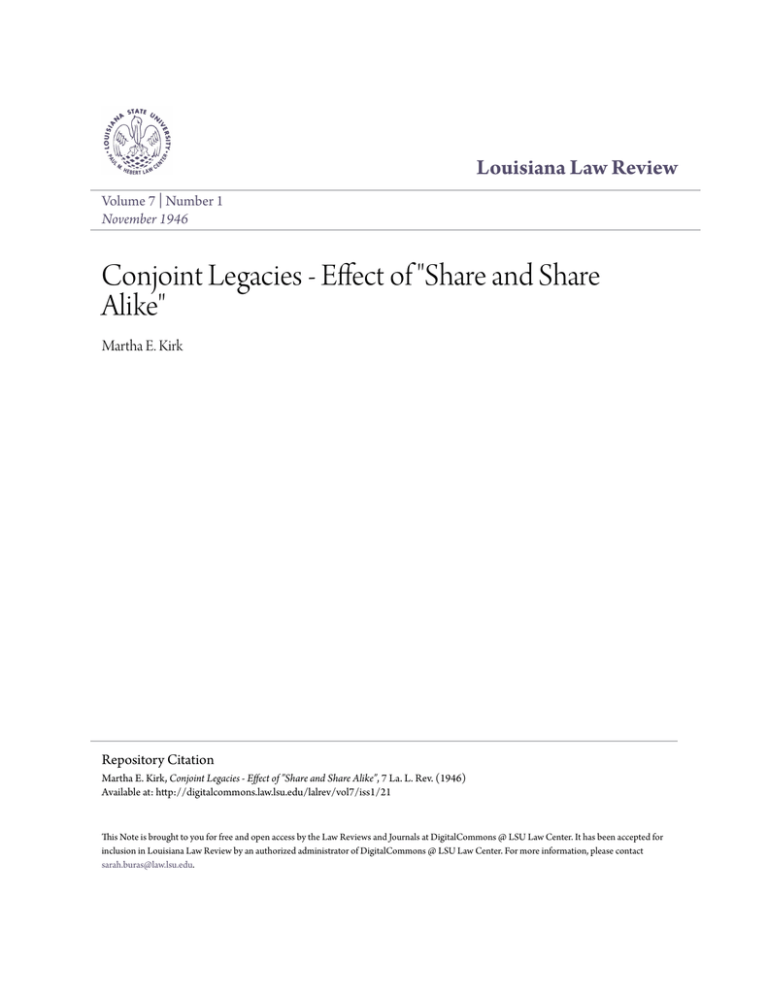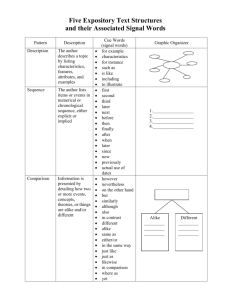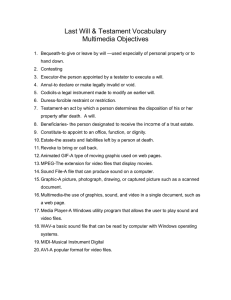Conjoint Legacies - Effect of "Share and Share Alike"
advertisement

Louisiana Law Review Volume 7 | Number 1 November 1946 Conjoint Legacies - Effect of "Share and Share Alike" Martha E. Kirk Repository Citation Martha E. Kirk, Conjoint Legacies - Effect of "Share and Share Alike", 7 La. L. Rev. (1946) Available at: http://digitalcommons.law.lsu.edu/lalrev/vol7/iss1/21 This Note is brought to you for free and open access by the Law Reviews and Journals at DigitalCommons @ LSU Law Center. It has been accepted for inclusion in Louisiana Law Review by an authorized administrator of DigitalCommons @ LSU Law Center. For more information, please contact sarah.buras@law.lsu.edu. Notes CONJOINT LEGACIES-EFFECT OF "SHARE AND SHARE ALIKE"- The heirs at law of Frederick Lambert brought an action to recover from Robert Vincent Lambert one-half the property bequeathed under the following clause of the testator's will: "After all my debts and obligations are paid I leave the residue of my estate to my brothers Robert Vincent Lambert and Albert Lambert share and share alike." Albert Lambert predeceased the testator and the defendant was placed in possession of the residuum of the estate. Plaintiffs contend that the residuary legacy was not conjoint and hence the defendant was not entitled, under the accretion articles, to the other legatee's share. Held, the legacy was not conjoint, the testator having divided the shares into definite unequivocal portions by the use of the phrase "share and share alike." Succession of Frederick Lambert, La. Sup. Ct. Docket No. 37,997 (June 14, 1946).1 The question presented involves an interpretation of the will in the light of Article 1707 of the Civil Code. This article provides that a legacy is conjoint when the testator has not assigned the legatee's part in the thing bequeathed.' Whether the use of the words "share and share alike" constituted such an assignment was the court's only concern, since it was admitted that without those words the legacy would have been conjoint. In the early case of Parkinson v. McDonough3 the Louisiana court adopted what was recognized by the French as a distinction between a bequest "in equal portions," and one "to be divided in equal portions." The latter phrase would constitute a conjoint legacy, the words "to be divided" clearly indicating that the division is to take place sometime in the future only for the benefit of those legatees capable of inheriting at the time the testament is executed. On the other hand, the words, "in equal portions," 1. Rehearing denied October 10, 1946. For a discussion of the effect of this case on prior-acquired property rights, see Comment, supra p. 133. That note discusses the statement of the court to the effect that the present decision would be given prospective effect only. 2. Art. 1707, La. Civil Code of 1870: "The legacy shall be reputed to be made conjointly when it is made by one and the same disposition without the testator's having assigned the part of such colegatee in the thing bequeathed." Article 1707 has been taken from Article 1700 of the French text of the Louisiana Civil Code of 1825. However, the words "the part of such colegatee" is an erroneous translation of the French "la part de chacun des co-16gataires," which means "the part of each one of the legatees," 3. 4 Mart.(N. S.) 246 (La. 1826). [138] 1946] NOTES merely stipulate that there must be a diivsion. No indication is given as to whether it was intended that the legacy be divided among the legatees at the date of the testament, or whether the actual division should take place upon the testator's death. Thus legacies containing this phrase are held not to be conjoint. Rigid adherence to the distinction thus set forth leads to the conclusion that the words "share and share alike" actually operate as a division of the legacy itself, since that clause, like "in equal portions," does not indicate that the division is intended to affect only the execution of the will. However, when the court was presented with this problem in the Succession of Wilcox,4 it refused to apply this subtle distinction and expressed the opinion that there was no difference in the meaning of the two phrases, "to be equally divided" and "share and share alike." 5 In expressly overruling the Wilcox case, the court in the present decision gave literal application to the distinction in Parkinson v. McDonoagh, reasoning that there was nothing in the bequest to indicate that the division of the legacy was to have future operative effect. Thus the division comprehended by the words "share and share alike" must have been intended to take effect at the time the testament was drawn, precluding any possibility of accretion. In overruling prior jurisprudence, the court assigned no particular error or oversight of authority in the decisions in previous cases.6 But, as set forth in the dissenting opinion, it would seem that the court lost sight of the fact that no testament can take effect before the death of the testator, and that the testator must have intended that the division have only future operative effect. The use of the words "share and share alike" in a gift inter vivos 4. 165 La. 803, 116 So. 192 (1928). This case was followed on the point in issue by Succession of Maus, 177 La. 822, 149 So. 466 (1933) and by the United States Supreme Court in Mackie v. Story, 93 U. S. 589, 23 LEd. 986 (1877). 5. 165 La. 803, 808, 116 So. 192, 194. "It is said that the meaning and effect of the expression 'share and share alike' is the same as if the testatrix had given, in terms, to each one of the five legatees named, separately, one- fifth of the residue of her estate. Our opinion, to the contrary, Is that the expression 'share and share alike' had no particular reference . . . to the fractional part which each should receive of the residue of the estate, but meant merely that the residue of the estate should be divided equally among the residuary legatees, without regard for the number of them. ... "Surely, there is no difference in the meaning between 'to be equally divided among them' and 'share and share alike'." 6. As to the manner In which the supreme court has treated this question in the past, both the prevailing opinion and the dissenting opinion handed down contain a careful resume of prior jurisprudence. The courts formerly held that the words "share and share alike" did not work an ab- solute division of the legacy itself. For a review of former jurisprudence, the reader Is, therefore, referred to the opinion, LOUISIANA LAW REVIEW [VOL. VII serves to divide the gift into an equal number of portions at the time of the gift. But a gift mortis causa can only take effect in the future, at which time it shall be divided "share and share alike" among the legatees capable of taking. By the mere fact that deceased left a will, it must be presumed that he intended to die testate as to all of his property, unless there are words to the contrary in the testament. The intention of the testator is of prime importance in the interpretation of acts of last will. As stated in Article 1712 of the Civil Code, 7 the testator's intention "must principally be endeavored to be ascertained, without departing, however, from the proper signification of the terms of the testament." The average layman knows little of the technical distinctions of such phrases. If it is possible to ascertain his intention without reference to those distinctions, it would seem that the rules of testamentary construction would require that this be done. Otherwise, the rules laid down in the Code for the purpose of safeguarding every individual right in the matter of distribution of estates would be lost. CONSTITUTIONAL LAW - MARTHA INTERSTATE COMMERCE - E. KIRK SEGREGATION STATuTEs-Appellant, a negro woman who was traveling interstate in Virginia on a motor common carrier, refused to accede to a request of the driver to move to the back seat to permit white passengers to be seated.1 She was arrested, tried and convicted under a Virginia segregation statute. 2 This act required designation of separate seating space for white and negro passengers, directed the driver "at any time when it may be necessary or proper for the comfort and convenience of the passengers so to do, to change the designation so as to increase or decrease the amount of space or seats set apart for either race," and made refusal to take a seat assigned by the driver a misdemeanor.4 On a writ of error the conviction was affirmed by the Supreme Court of Appeals of Virginia. 5 Held, reversed. Seating arrangements for the different races in interstate motor travel require a single, 7. La. Civil Code of 1870. 1. Six white passengers were standing, while there were two vacant spaces on the long rear seat. Appellant was sitting in the second seat toward the front from the long seat in the extreme rear of the bus. 2. Va. Code Ann. (Michie, 1942) §§ 4097z, 4097aa, 4097bb, 4097cc, 4097dd. 3. Va. Code Ann. (Michie, 1942) § 4097bb. 4. Va. Code Ann. (Michie, 1942) § 4097dd. 5. 184 Va. 24, 34 S.E.(2d) 491 (1945).




